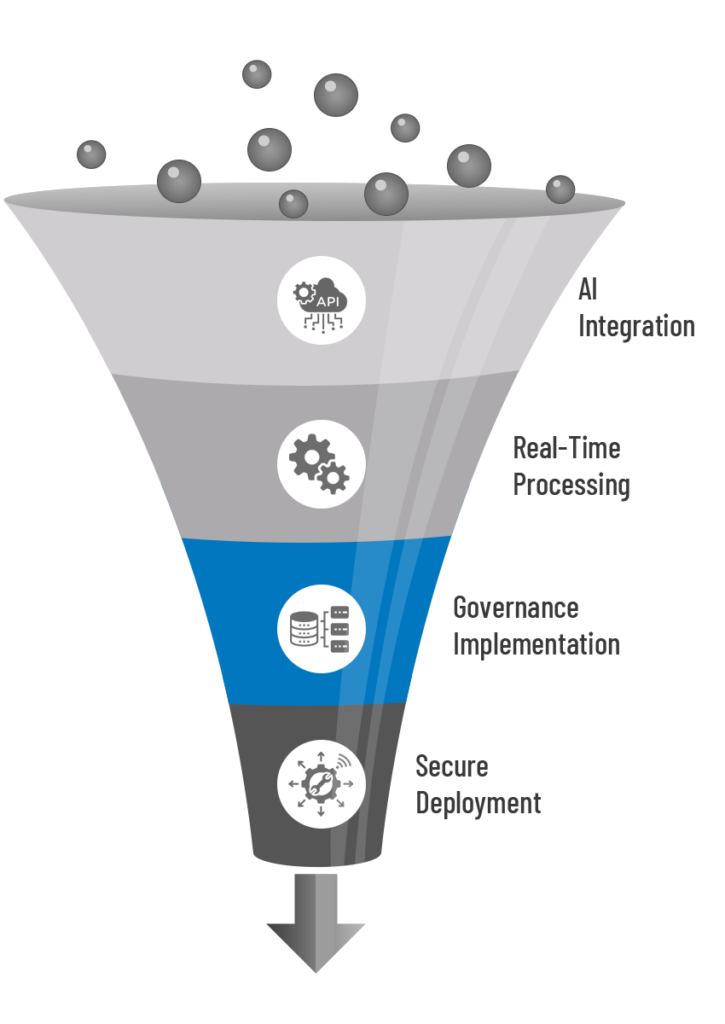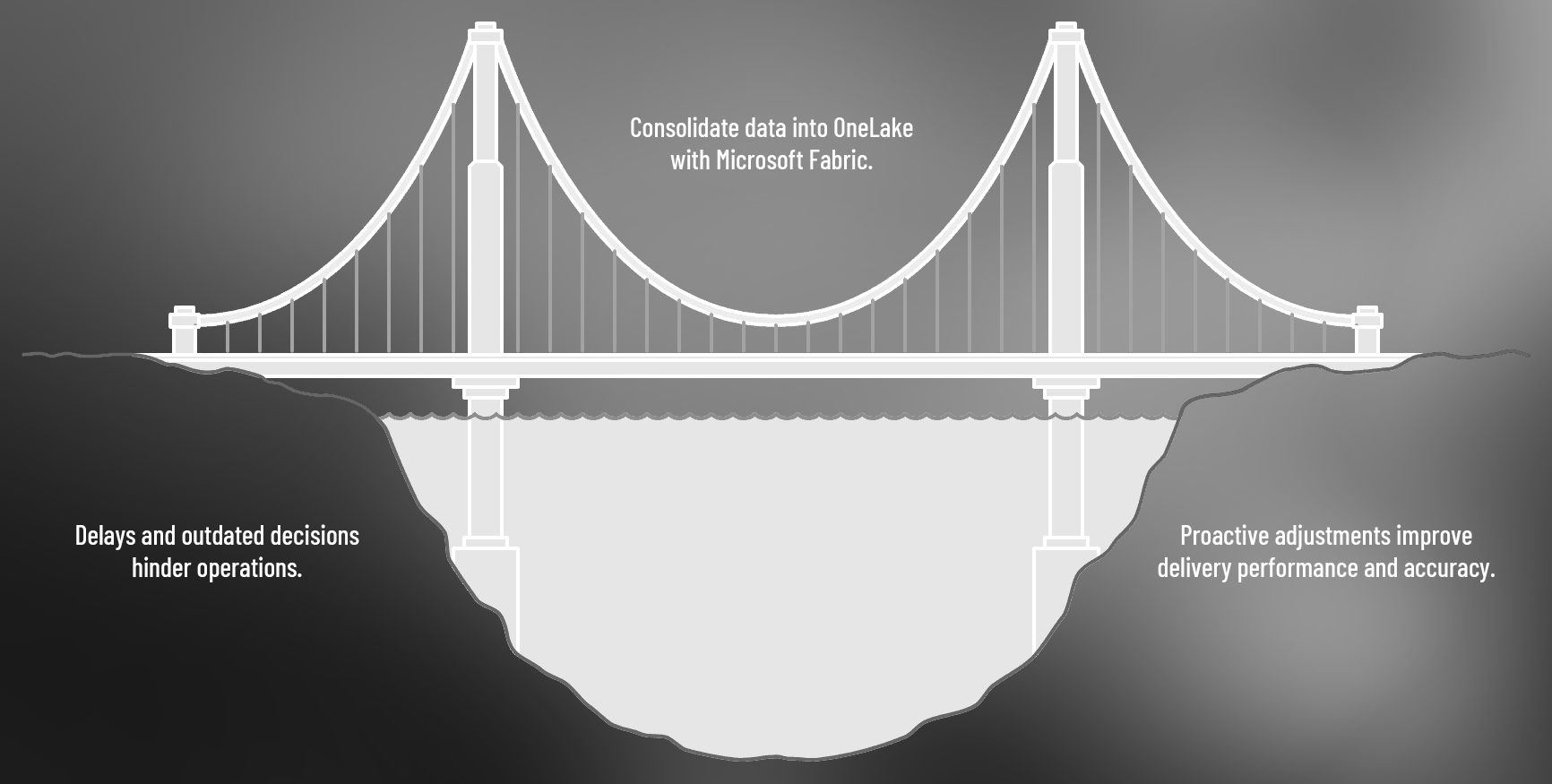+1- 469-353-2525

Across industries, one theme remains consistent: enterprises are sensing the value AI can bring to them and investing heavily but are struggling to realize its full potential. The most common culprit isn’t a lack of innovation or motivation, it’s the fragmentation of data.
After working with clients in logistics, healthcare, and manufacturing for over the last 2 decades, we can confidently say that the most advanced AI models are only as effective as the data they rely on. Without a unified, secure, and agile data foundation, most AI initiatives stall well before they reach production.
Microsoft Fabric offers a different path. It introduces an integrated platform designed to bring structure, governance, and intelligence into every layer of the data lifecycle. For enterprises, this isn’t a new toolset. It’s a new operating model.
At Seanergy AI, we see Fabric as the architectural shift that finally aligns data engineering, analytics, governance, and automation in a way that’s scalable and enterprise-ready.
Moving from Data Infrastructure to Data as a Product
Historically, data has been treated as an internal utility. It’s been stored, queried, and moved but rarely effectively governed or treated with the same intentionality as other enterprise assets.
Microsoft Fabric changes that approach. By consolidating data into OneLake, organizations gain a single, logical data layer across all analytics workloads. Combined with built-in row-level and column-level security, Fabric enables consistent, policy-driven access across the organization. This elevates data from infrastructure to a governed, shareable product that can serve every part of the business
Modernizing Data Pipelines
Rigid, complex ETL pipelines have become a major bottleneck for modern data teams. Whether adapting to new data sources, ingesting real-time sensor streams, or managing version control across development environments, traditional tools have fallen behind.
Fabric introduces dynamic, parameterized pipelines that allow teams to build modular workflows. These are easier to test, faster to deploy, and significantly more adaptable to business changes. For enterprises working with fast-moving operational data such as logistics tracking, patient admissions, or supply chain signals this flexibility translates directly into speed and resilience.
Reducing Operational Overhead with Autoscaling Compute
One of the quiet cost drivers in enterprise data platforms is static computing. Organizations over-provision for peak usage, only to see resources sit idle for most of the day. The autoscale Spark capabilities in Fabric address this directly by aligning resource allocation to actual consumption.
This not only lowers cost but also enables data science and analytics teams to scale workloads dynamically, whether training AI models, processing real-time telemetry, or analyzing historical trends. More importantly, it frees up budget and operational time for innovation rather than infrastructure tuning.
Operationalizing DevOps in the Data Stack
As enterprise platforms mature, automation and standardization are no longer optional. The CLI (Command-Line Interface) support in Fabric means that workspaces, pipelines, and resources can now be deployed through code aligned with CI/CD practices already in place across most engineering teams.
This improves consistency, reduces manual error, and allows governance and the ability to audit to be built into the deployment process. For large organizations with global teams and strict compliance needs, this automation of these kind becomes a competitive advantage.
Supporting Hybrid Scenarios with Real-Time Synchronization
Many industries still rely on on-premises systems, either for regulatory reasons or because core operations haven’t migrated to the cloud. The mirrored PostgreSQL support in Fabric helps bridge this gap, enabling real-time synchronization between on-prem and cloud environments.
For enterprise architects, this means they no longer must choose between legacy systems and modern analytics. Fabric makes both possible, simultaneously.
Client Results: Logistics Firm, North America
Problem:
Over 10K shipments/day across disconnected systems. No unified visibility. Planning decisions lagged 48–72 hours behind operations.

Our Fabric-Led Solution effectively helps with your migration within 6-9 weeks:
- Centralized data into OneLake
- Configured dynamic pipelines and autoscaling Spark
- Enabled secure data sharing across 3 regions
- Delivered executive dashboards in Power BI
Impact in First 60 Days:
- 21% reduction in delayed shipments
- $2.3M cost avoidance through proactive routing
- 3x faster access to network congestion metrics
- 100% visibility into in-transit exceptions
Let's talk outcomes. Not just architecture.
have any questions?
The Future is Here. Partner with Seanergy. Schedule here to begin your Transformation Journey.
Contact Us
-
-
-
Corporate Office: 7800 Preston RD #115, Plano, TX 75024
-
Global Locations:
-
5830 Granite Pkwy #100, Plano, TX 75024
-
Block - D, Level 1, Cyber Gateway, Hyderabad — 500 081

